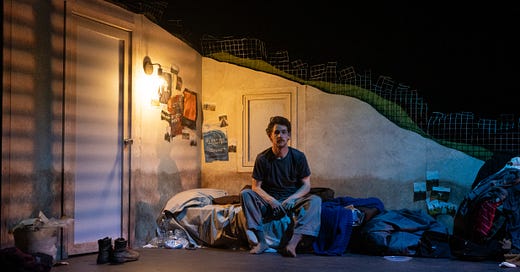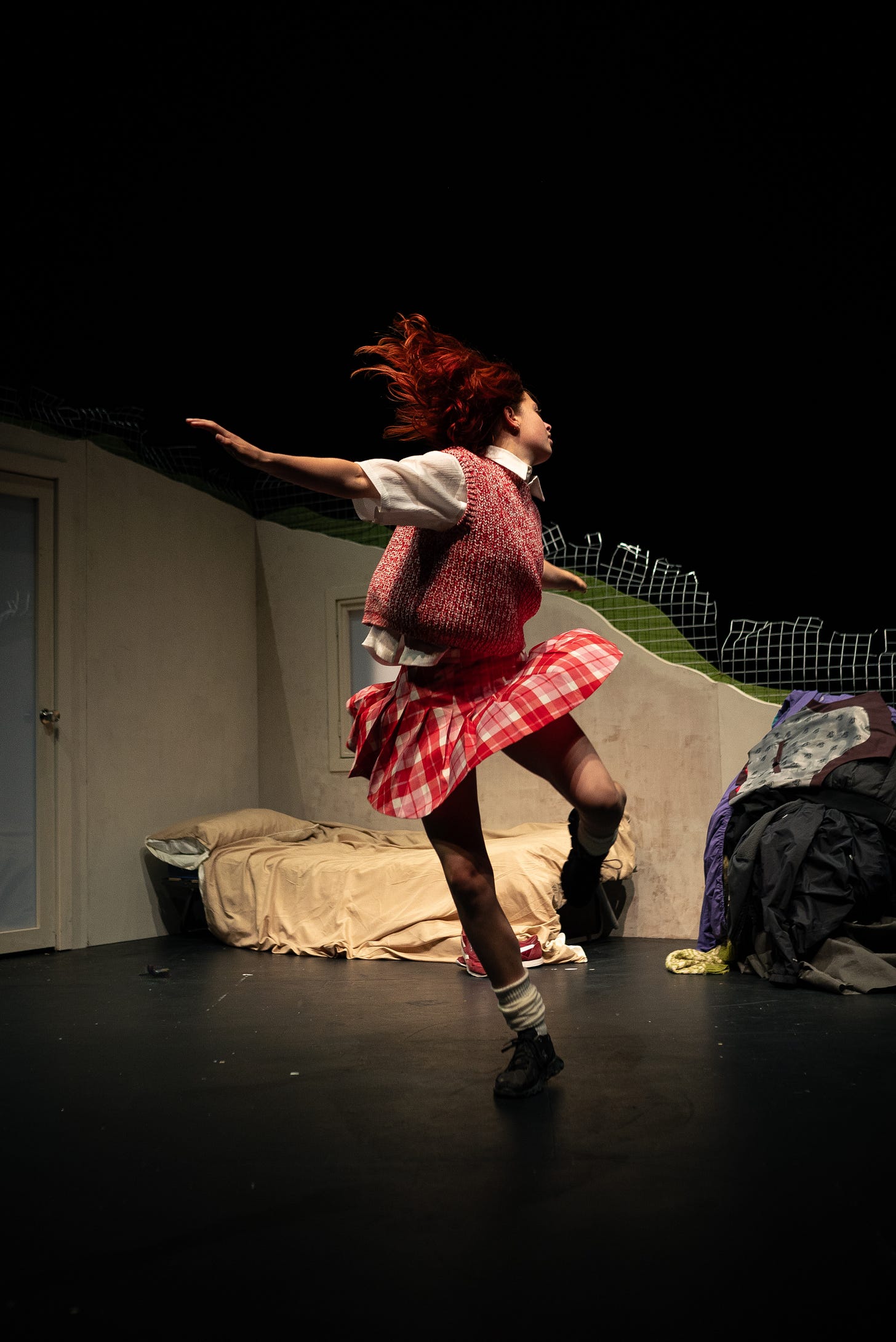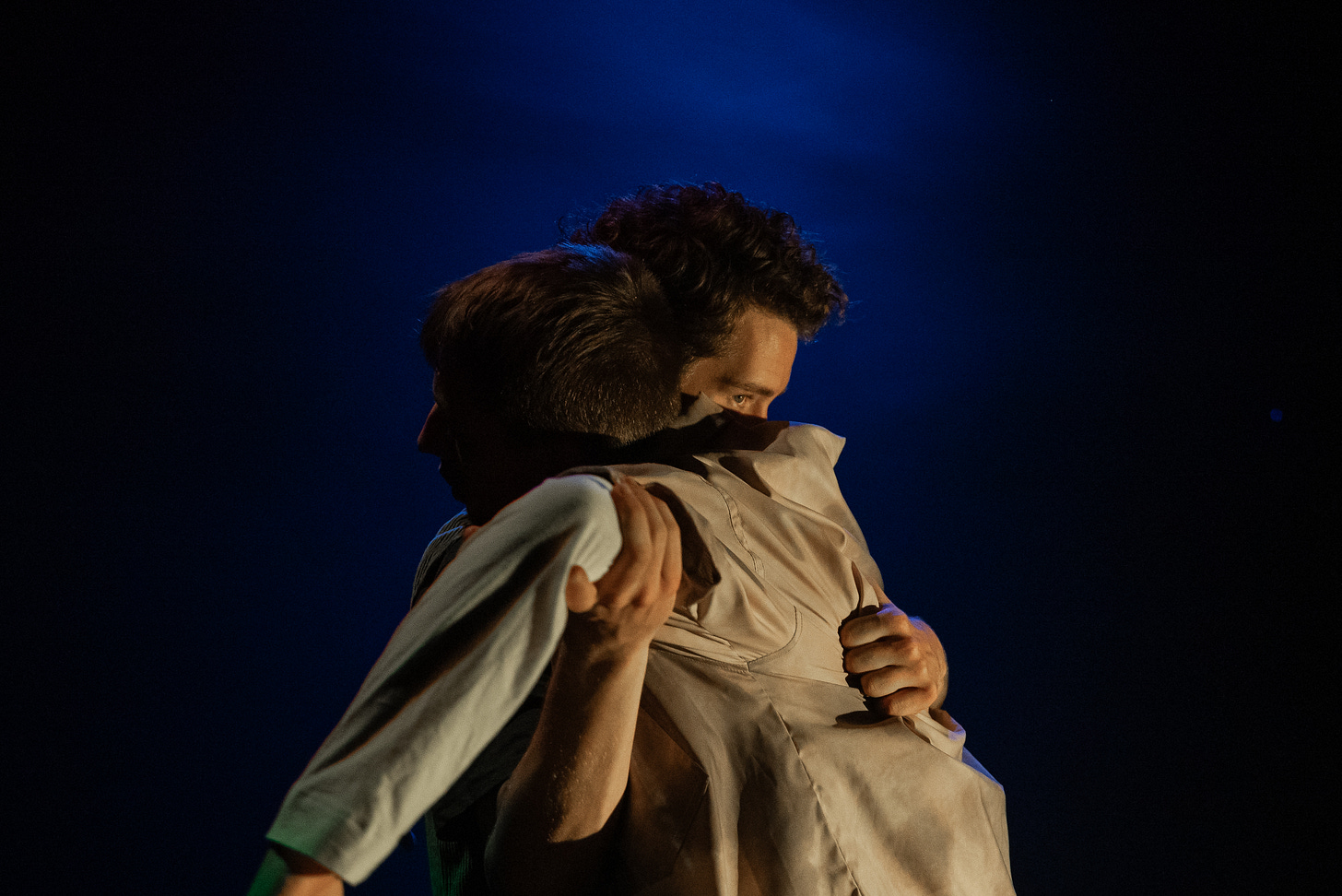Shining a light on male mental health: Northern Rascals bring 1,420 unheard voices to the stage.
Review of Sunny Side at Dance City, Newcastle.
A dimly lit bedroom; small, crumbling, rising damp staining the beige walls which seem to sag around a sleeping form.
18-year-old ‘K’ (Soul Roberts) is dreaming. Afloat upon his mother’s sweet voice, “I’ve got you”, the opening image is one of calm and peace. There is a ripple of empathetic understanding through the audience as K’s jarring iPhone alarm interrupts that peace - another Monday has begun.
Northern Rascals’ Sunny Side depicts the struggles of a young man living in the Calder Valley - left behind, in a monotonous job, no opportunities on the horizon. Combining dance with spoken word, the work follows K through uncertain, sometimes imagined environments, all shrouded in the gloom of mental illness.
Repetition is hard to do well, and I generally feel that once an audience gets the point, it’s time to move on. Emphasising his mundane life, K’s morning routine repeats relentlessly; alarm, wake, dress, toast, work... Wash, rinse, repeat. The movement here could be developed, or the loop broken sooner, as it makes for a slightly weak start to what later builds into an evocative portrayal of the struggles many young men face in small British towns.
Feeling left behind by Danny, his friend who has flown the nest to attend Manchester University, K represents over 1420 young people whom Northern Rascals met with over a 4 year period. Condensing all those perspectives into one show is no mean feat, and while some elements are more developed than others, (in particular, references to class and politics are a little vague) the overall effect is a work that feels grounded in reality, and shines an important light on an often-misunderstood demographic.
The cold glow of his phone screen lighting up the dingy corner of his room, K scrolls, a mere witness to other peoples’ freedom. Aaron Howl’s digital design, paired with Barnaby Booth’s effectively bleak lighting, really drive home that sickeningly relatable feeling of being left behind.
Soul Roberts as K, by Elly Welford.
Weighed down by more than his thin duvet and dirty laundry, Roberts’ movement brings K’s isolation to life; heavy limbs, feet and elbows dragging across the floor, as he rolls and ripples between his bed and his overflowing bin. The desolate scene is finally lifted by the entrance of Danny (Ed Mitchell), whose refreshingly energetic, boisterous movement brings a lightness both to the story and to K. While their exact relationship is unclear, what is evident is that K depends on Danny, and when he gathers his things to leave again, the sadness drips from K like a sodden sponge.
The distance between K’s life and that of his friends is emphasised by Caitlin Mawhinney’s clever set design, effectively splitting the space into two halves: K’s cluttered, shabby room, and the spacious outside world. Tiptoeing the border line feels precarious yet exciting, and when K is finally swept beyond the confines of his own space, by the whirlwind that is Sophie Thomas, the spinning, giddy joy of escape is palpable.
The duet that follows is definitely the pinnacle of the work, and was nothing short of breathtaking. Thomas’ combination of joyful innocence and sparky, whirling energy makes her a standout performer, bringing a beautiful feeling of flight to the stage. Roberts’ response as K is equally moving, embodying the endearing awkwardness of first love, seen through the rose-tinted glasses of Booth’s emotive lighting. Flinging themselves headfirst - literally - into the brief relationship, it is unfortunately tinged with something dark and uncomfortable towards the end when hands grip a little too tightly, and the raised voices of K’s parents outside the door sour what had at first been so pure. By the time Thomas’ character leaves, the space she had filled so effortlessly now feels twice as empty.
Sophie Thomas by Elly Welford.
After a slightly clunky scene change which probably could have been an interval, the second act unfortunately never rises to the emotional height of the first. K visits Danny at uni, and we are thrust into a rave scene that falls slightly flat despite the energetic efforts of the performers. Thomas returns as a different character, although this is unclear at first, slightly distracting from the immersion of the world. With unclear action and some scenes that feel unnecessary to the story, the sound score by Wilfred Kimber that had previously held everything together effortlessly, begins to grate. Overlaid by Anna Holmes’ script, performed as recorded voiceover, the verbose imagery can feel like too much at times - particularly when there is already so much movement to take in. I would have appreciated more space to hear the words, as Holmes’ poetic writing is certainly strong enough to stand alone.
That being said, key phrases stand out and linger in the mind, bringing us to a strong finale. Danny and K dance a powerful, emotionally-charged duet under the sombre street lights, which brings both dancers’ skill to the forefront. They push their physicality to the limits, clinging to eachother, falling, flying, catching, spinning. A moving depiction of how, whilst Danny acts as a lifeboat, K is still caught up in his own personal tempest - his fate left open to our imagination.
Ed Mitchell and Soul Roberts, by Elly Welford.
While some of the storytelling is heavy handed, and the pacing drags at a lengthy 85 minutes, the dance is where this show truly shines. Balancing clarity and virtuosity with a refreshing looseness, the emotion never feels forced when it is told through the body. Bringing attention to the male loneliness epidemic, and the impacts of gentrification on some of Britain’s forgotten towns, Sunny Side touches on important, universal themes with care.
Sunny Side by Northern Rascals was performed at Dance City, Newcastle on Wednesday 18th June, concluding a national tour.
Created by Co-Artistic Directors Anna Holmes and Sam Ford, the work is toured in partnership with Andy’s Man Club: https://andysmanclub.co.uk/







Male mental health is one of those issues that is challenged in several ways in our society and I feel is becoming a bigger and bigger problem. It is a very complex issue to tackle, but your article suggests that dance company were successful in some part. You seem to be suggesting that more thought and care should have been taking to have a stronger and clearer impact. Dave.